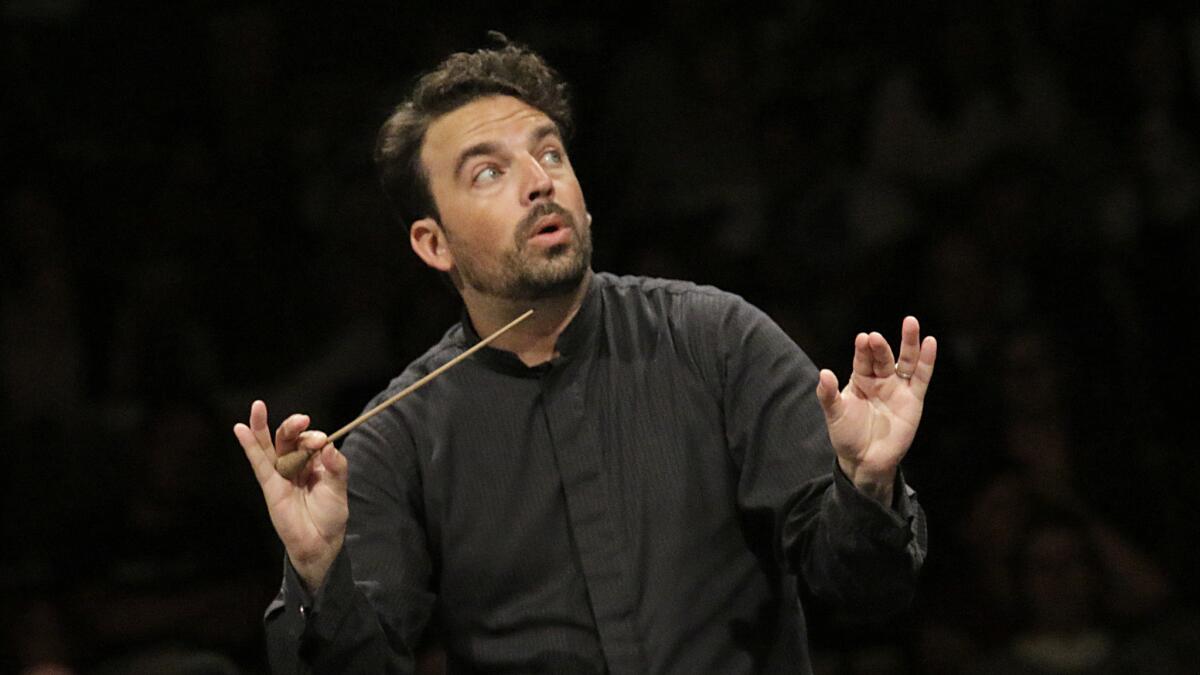Review: Pianist Yundi adds some flair, but his Beethoven still lacks drama at Bowl

James Gaffigan conducts the L.A. Philharmonic in Shostakovich’s Fifth Symphony at the Hollywood Bowl.
- Share via
Thursday night marked midsummer for the Los Angeles Philharmonic, halfway back to the future. This was its 17th appearance and the end of its fifth week at the Hollywood Bowl this year. Sixteen concerts and five more weeks remain in a summer that began with a 30th anniversary tribute to the film “Back to the Future.”
Coming up, the L.A. Phil will play along with screenings of “2001” and “E.T.” and participate in myriad other activities. It will perform “La Traviata” and collaborate with American Ballet Theatre in Leonard Bernstein’s “Fancy Free.” The Tuesday and Thursday stream of mainstream classics will continue, with very little new.
There could be more currency than so many favorite old films, favorite old concertos, favorite old symphonies and favorite old faces. But it seems to work. Attendance has been good this summer. The tasteful spiffing up of the Bowl over the last few summers has improved much of what can be improved (helicopters buzzing Cahuenga Pass, a particular nuisance Thursday, appear beyond the will and/or power of the LAPD to control). Sound and video have never been better.
SIGN UP for the free Essential Arts & Culture newsletter >>
Thursday night was a typical Bowl night of standard repertory, solid performances of a couple of famous Fifths — Beethoven’s Piano No. 5 and Shostakovich’s Symphony No. 5. There were no revelations, but given how little rehearsal time is allotted, they were impressively played.
Yundi was the attraction. It was the Bowl debut of the 32-year-old Chinese pianist, but he is well known, if not quite the superstar here he is in China. He made his name internationally as Yundi Li at 18 as winner of the International Chopin Piano Competition in Poland. He is admired for his elegance, immaculate technique, sterling tone and lack of affectation on stage or interpretively. He has been the un-Lang Lang, although his flock of young fans find him just as cute.
His image, however, is changing, and at the Bowl with its giant hi-def video monitors, that gets noticed. A while ago, he dropped the Li from his name, and he’s beginning to embrace Lang Lang-ish flair. His jacket lapel Thursday was ornamented with I’m not sure what, but the pianist looked to be draped in a bejeweled keyboard.
He wore ostentatious chains around his neck, including a very large crucifix. He appeared to be transported as he played and sometimes conducted the orchestra along with the evening’s guest conductor, James Gaffigan. Yundi has even begun following Lang Lang into the pop arena. Earlier this year, he made a Toyota commercial for Chinese television with Taylor Swift.
There is nothing unusual about such glitz in China and many other places, including the Hollywood Bowl. Attractive young artists — with encouragement from another Chinese pianist, Yuja Wang — have lately enhanced the Bowl’s image with a beguiling modern fashion sense, even if French pianist Jean-Yves Thibaudet (who closes the orchestra’s Bowl season next month) has been long ahead of the curve.
Yundi’s trivial problem is that — unlike Lang Lang, Wang, Thibaudet or Liberace — he can come off as self-conscious. He is not a natural showman. He is not an especially colorful interpreter. He looks out of place with Swift.
Nor does glitter become Yundi’s Beethoven. The so-called “Emperor” Concerto (not Beethoven’s name; the composer intended no glorification of Napoleon) does, beginning with its opening keyboard flourish, happen to have a keyboard part of sophisticated sparkle. Yundi brought to that clarity, accuracy, careful dynamics and a tiny hint of uplift.
Watching Yundi as he played was not always illuminating. His conducting seemed more for himself than the orchestra, as though a kind of physical therapy for helping him slow down and preparing for a lyrical theme or for working himself into a sweat.
But he is not exciting. Beethoven gives the pianist the opportunity to make a listener feel as though lifted from his seat. Yundi didn’t do that. He played the notes, not what was in between them. But he played the notes extremely well. He was at home with the calm beauty of the slow movement. He gave Beethoven’s trills a wonderfully smooth, Zen-like ringing quality, but when he went for thrills, he made it seem as though someone else were telling him what to do. The trills will be remembered.
For his part, Gaffigan kept the orchestra enthusiastically propulsive in the concert and in Shostakovich’s Fifth Symphony. The trend with Shostakovich’s most popular symphony is to attempt to go back to the Soviet future and uncover deeper meaning. The symphony is one of 20th century music’s great question marks. Was the composer writing a triumphant work to get Stalin off his back or loading the score’s populist style and blatantly victorious finale with caustic irony?
Gaffigan took the symphony at face value, refreshingly cleansing it of guess work. He led a straightforward, capably played, rhythmically acute, texturally clear, unfussy yet dramatic performance. This was the real back to future, and it worked.
More to Read
The biggest entertainment stories
Get our big stories about Hollywood, film, television, music, arts, culture and more right in your inbox as soon as they publish.
You may occasionally receive promotional content from the Los Angeles Times.











